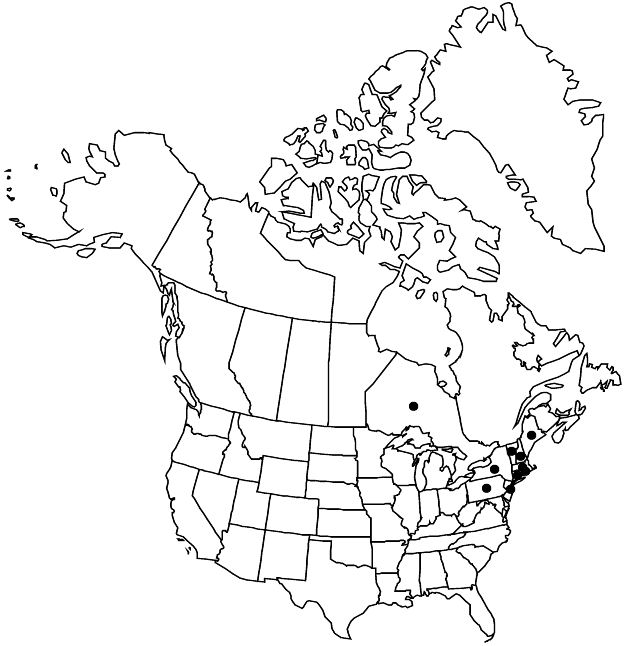Difference between revisions of "Vitis ×novae-angliae"
Rhodora 19: 146. 1917. as species
FNA>Volume Importer |
imported>Volume Importer |
||
| (6 intermediate revisions by 2 users not shown) | |||
| Line 6: | Line 6: | ||
|place=19: 146. 1917 | |place=19: 146. 1917 | ||
|year=1917 | |year=1917 | ||
| + | |other_info_on_pub=as species | ||
}} | }} | ||
|common_names=New England grape | |common_names=New England grape | ||
| Line 28: | Line 29: | ||
|elevation=70–1400 m. | |elevation=70–1400 m. | ||
|distribution=Ont.;Conn.;Maine;Mass.;N.H.;N.J.;N.Y.;Pa.;R.I.;Vt. | |distribution=Ont.;Conn.;Maine;Mass.;N.H.;N.J.;N.Y.;Pa.;R.I.;Vt. | ||
| − | |discussion=<p>Vitis ×novae-angliae is a presumed hybrid between V. labrusca and V. riparia and is common in the New England region (M. O. Moore 1991).</p> | + | |discussion=<p><i>Vitis ×novae-angliae</i> is a presumed hybrid between <i>V. labrusca</i> and <i>V. riparia</i> and is common in the New England region (M. O. Moore 1991).</p> |
|tables= | |tables= | ||
|references= | |references= | ||
| Line 37: | Line 38: | ||
-->{{#Taxon: | -->{{#Taxon: | ||
name=Vitis ×novae-angliae | name=Vitis ×novae-angliae | ||
| − | |||
|authority=Fernald | |authority=Fernald | ||
|rank=species | |rank=species | ||
| Line 52: | Line 52: | ||
|publication year=1917 | |publication year=1917 | ||
|special status=Endemic | |special status=Endemic | ||
| − | |source xml=https:// | + | |source xml=https://bitbucket.org/aafc-mbb/fna-data-curation/src/2e0870ddd59836b60bcf96646a41e87ea5a5943a/coarse_grained_fna_xml/V12/V12_693.xml |
|genus=Vitis | |genus=Vitis | ||
|subgenus=Vitis subg. Vitis | |subgenus=Vitis subg. Vitis | ||
Latest revision as of 19:17, 5 November 2020
Plants high climbing, sparsely branched. Branches: bark exfoliating in shreds; nodal diaphragms 0.3–1.1 mm thick; branchlets terete, sparsely arachnoid or glabrous, growing tips not enveloped by unfolding leaves; tendrils along length of branchlets, persistent, branched, tendrils (or inflorescences) at 3+ consecutive nodes, usually not at all nodes; nodes not red-banded. Leaves: stipules 2.5–6 mm; petiole 1/2 to ± equaling blade; blade cordate, 10–20 cm, usually 3-shouldered, apex acute to short acuminate, abaxial surface not glaucous, ± densely arachnoid when young, sparsely arachnoid when mature, visible through hairs, adaxial surface usually glabrous. Inflorescences 7–13 cm. Flowers functionally unisexual. Berries black, slightly glaucous, globose, 12+ mm diam., skin separating from pulp; lenticels absent.
Phenology: Flowering Jun; fruiting Aug–Sep.
Habitat: Thickets, roadsides, pond and stream margins, fence- and hedgerows.
Elevation: 70–1400 m.
Distribution

Ont., Conn., Maine, Mass., N.H., N.J., N.Y., Pa., R.I., Vt.
Discussion
Vitis ×novae-angliae is a presumed hybrid between V. labrusca and V. riparia and is common in the New England region (M. O. Moore 1991).
Selected References
None.